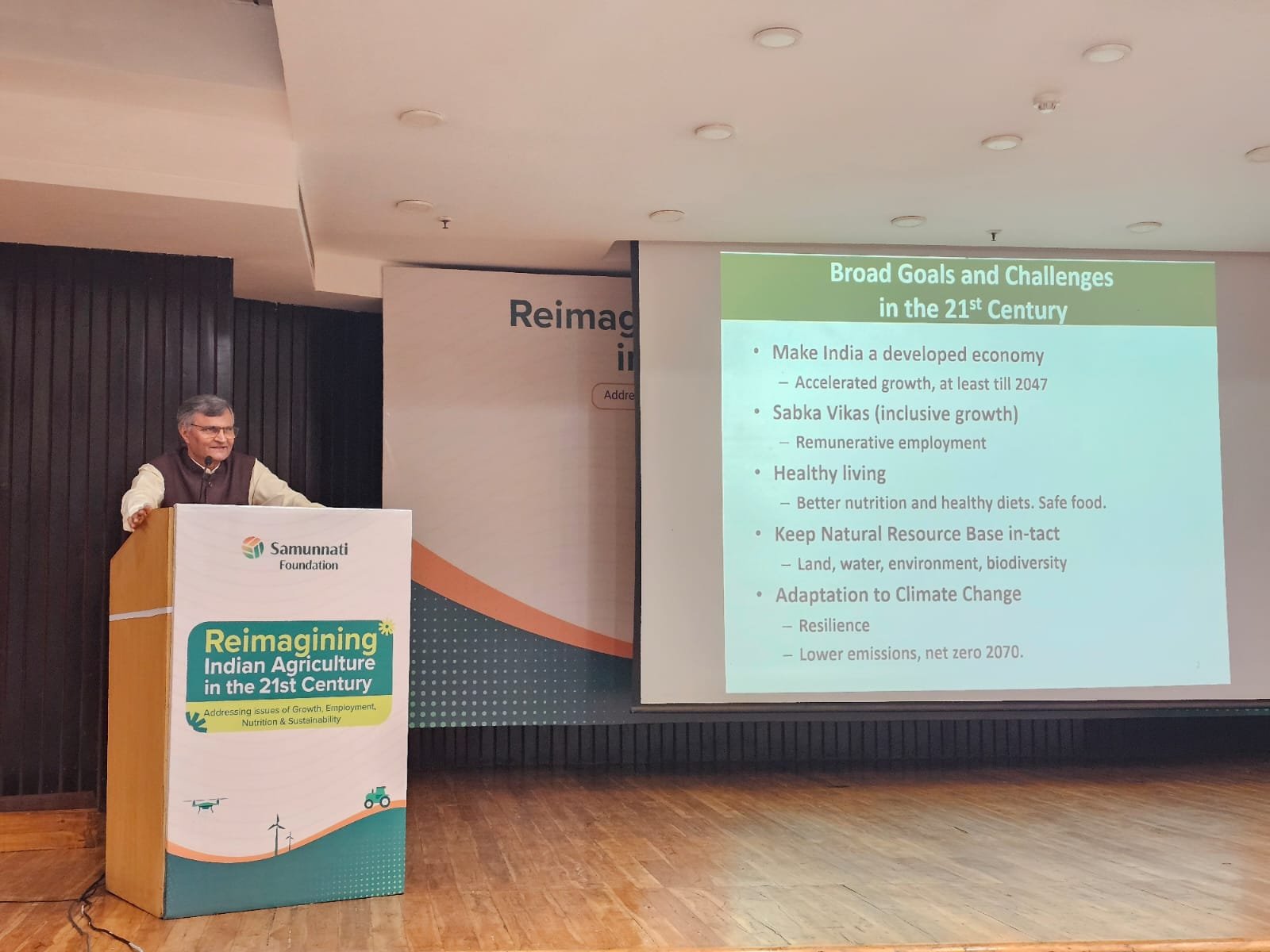Sunday, 22 February 2026

India’s agricultural transformation must go beyond boosting yields—it must align with evolving consumption patterns, emerging market demand, and sustainability goals. Prof. Ramesh Chand, Member, NITI Aayog, strongly advocated this shift in agricultural policy during his thought-provoking public lecture titled “Reimagining Indian Agriculture in the 21st Century”, held in New Delhi.
Addressing a diverse audience of policymakers, researchers, agri-industry stakeholders, and students, Prof. Chand emphasized the urgent need for a paradigm shift—from a production-centric approach to one that prioritizes nutrition, employment generation, environmental sustainability, and market responsiveness.
“Agriculture must go beyond merely producing crops. There is immense potential to unlock value at the farm itself—value that traditionally belonged to manufacturing and services,” said Prof. Chand.
He highlighted India’s rising bio-economy and growing opportunities in biomedicine, bio-insecticides, and bio-pesticides as future growth drivers. He also pointed to recent agricultural data that reveals a structural dualism. While traditional field crops like cereals and pulses—mostly under the MSP regime—recorded just 1.6 per cent annual growth (2014–2023), high-value sectors such as horticulture (3.9 per cent), livestock (5.8 per cent), and fisheries (9.1 per cent) are expanding rapidly and dominating markets.
“This divergence highlights the changing nature of market demand. Farmers engaged in high-value agriculture are now dominating the market, while traditional field crops are losing economic relevance,” he said. Prof. Chand advocated for policy realignment to promote diversification into sectors like livestock and horticulture—particularly for farmers still reliant on field crops.
He also called attention to the increasing and “transformational” participation of women in agriculture, while reinforcing the need for sustainable management of natural resources to remain at the core of agricultural planning.
The event was presided over by Pravesh Sharma, Chairman Samunnati Foundation and featured expert commentary from leading voices in the field. Dr. Sudha Narayanan, Research Fellow at IFPRI, noted:
“It’s the consumer who is shaping technologies, markets, and even agricultural practices. Eating itself is an agri-practice. If we want to change farming, we must start by reshaping consumption behaviour. After years of agrarian crisis, India is finally seeing the beginnings of a Viksit Bharat powered by resilient, responsive agriculture.”
Adding further depth to the discussion, Harish Damodaran, National Rural Affairs and Agriculture Editor at the Indian Express shared insights into market transitions and institutional challenges shaping India’s farm sector.
Delivering the vote of thanks, Anil Kumar SG, Founder CEO of Samunnati, said: “With new-age agri-financing, inclusive value chains, and digitisation, agriculture is no longer just a means of survival—it’s becoming a powerful engine for inclusive growth. At Samunnati, we aim to ensure that smallholder farmers are not left behind in this transition.”
At Samunnati Foundation, we believe that meaningful dialogues have the power to shape the future of the agri ecosystem. By bringing together diverse voices—from farmers and FPOs to policymakers and innovators—we aim to foster inclusive conversations that spark ideas, share insights, and inspire solutions. These engagements help bridge gaps, build understanding, and catalyze action on the ground. Through every discussion, we reaffirm our commitment to enabling an open agri-value chain that works better for everyone it touches.
The engaging session called for reinforcing natural resource-based farming practices, accelerating diversification into high-value sectors, and unlocking the potential of India’s emerging bioeconomy. As India advances toward its Viksit Bharat vision, a reimagined, inclusive, and market-responsive agricultural sector will be central to realising this aspiration.